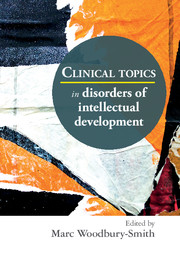Book contents
- Frontmatter
- Contents
- List of contributors
- Foreword
- Preface
- Part 1 Disorders of intellectual development: concept and epidemiology
- Part 2 Disorders of intellectual development: comorbidity and complications
- Part 3 Autism spectrum disorder
- Part 4 Service provision
- 12 Improving the general health of people with disorders of intellectual development
- 13 Bridging the gap: linking primary and secondary care for people with disorders of intellectual development
- 14 Ageing in people with disorders of intellectual development
- 15 Services for children with disorders of intellectual development and mental health needs
- 16 Forensic psychiatry for people with disorders of intellectual development: a personal reflection
- Index
15 - Services for children with disorders of intellectual development and mental health needs
from Part 4 - Service provision
Published online by Cambridge University Press: 01 January 2018
- Frontmatter
- Contents
- List of contributors
- Foreword
- Preface
- Part 1 Disorders of intellectual development: concept and epidemiology
- Part 2 Disorders of intellectual development: comorbidity and complications
- Part 3 Autism spectrum disorder
- Part 4 Service provision
- 12 Improving the general health of people with disorders of intellectual development
- 13 Bridging the gap: linking primary and secondary care for people with disorders of intellectual development
- 14 Ageing in people with disorders of intellectual development
- 15 Services for children with disorders of intellectual development and mental health needs
- 16 Forensic psychiatry for people with disorders of intellectual development: a personal reflection
- Index
Summary
Disorders of intellectual development (DID) are, by definition, global impairments of cognitive function with onset in the developmental years (i.e. before 18 years of age). As a lifelong condition, the specific health and social care needs of this population are different at different ages. Increasingly, there has been an emphasis on the social as opposed to medical model of disability. The social model of disability focuses on the barriers experienced by people with a disability that impede their full participation in family, community and society. In defining disability it is no longer sufficient to look only at the individual impairments or conditions without reference to the wider social environment.
This chapter focuses on mental health needs during childhood. It describes the epidemiology, aetiology, assessment and treatment of mental health problems, and models of service provision. In this chapter, DID is used synonymously with ‘learning disability’ and ‘intellectual disability’.
Epidemiology of mental health problems in DID
Various research studies and service development projects have estimated that at least 2.5% of the general population in Great Britain has a DID of such severity that, at some point in their childhood, they will need specialist services (Emerson & Hatton, 2008). Within this group, over one in three (36%) children and adolescents with a DID in Britain will have a diagnosable psychiatric disorder, compared with less than 10% of those of normal ability (Emerson, 2003; Emerson & Hatton, 2007).
Higher rates of psychiatric morbidity have been consistently reported in children with DID (Rutter et al, 1976; Corbett, 1979). Rutter et al (1976) reported that 30% of 10- to 12-year-old children with DID had a mental health disorder, compared with just 7% of children without. A more recent UK-wide enquiry by the Foundation for People with Learning Disabilities (2002) stated that approximately 40% of children and adolescents with DID are likely to have a diagnosable mental health problem. Emerson (2003) analysed data that had been collected by the Office for National Statistics in 1999 in a survey of the mental health of children and adolescents in Great Britain and found that in a sample of just over 10 000 children, 39% of 5- to 15-year-old children with DID had a diagnosable mental health problem (compared with 8% among children who did not have DID).
- Type
- Chapter
- Information
- Clinical Topics in Disorders of Intellectual Development , pp. 277 - 290Publisher: Royal College of PsychiatristsPrint publication year: 2015

